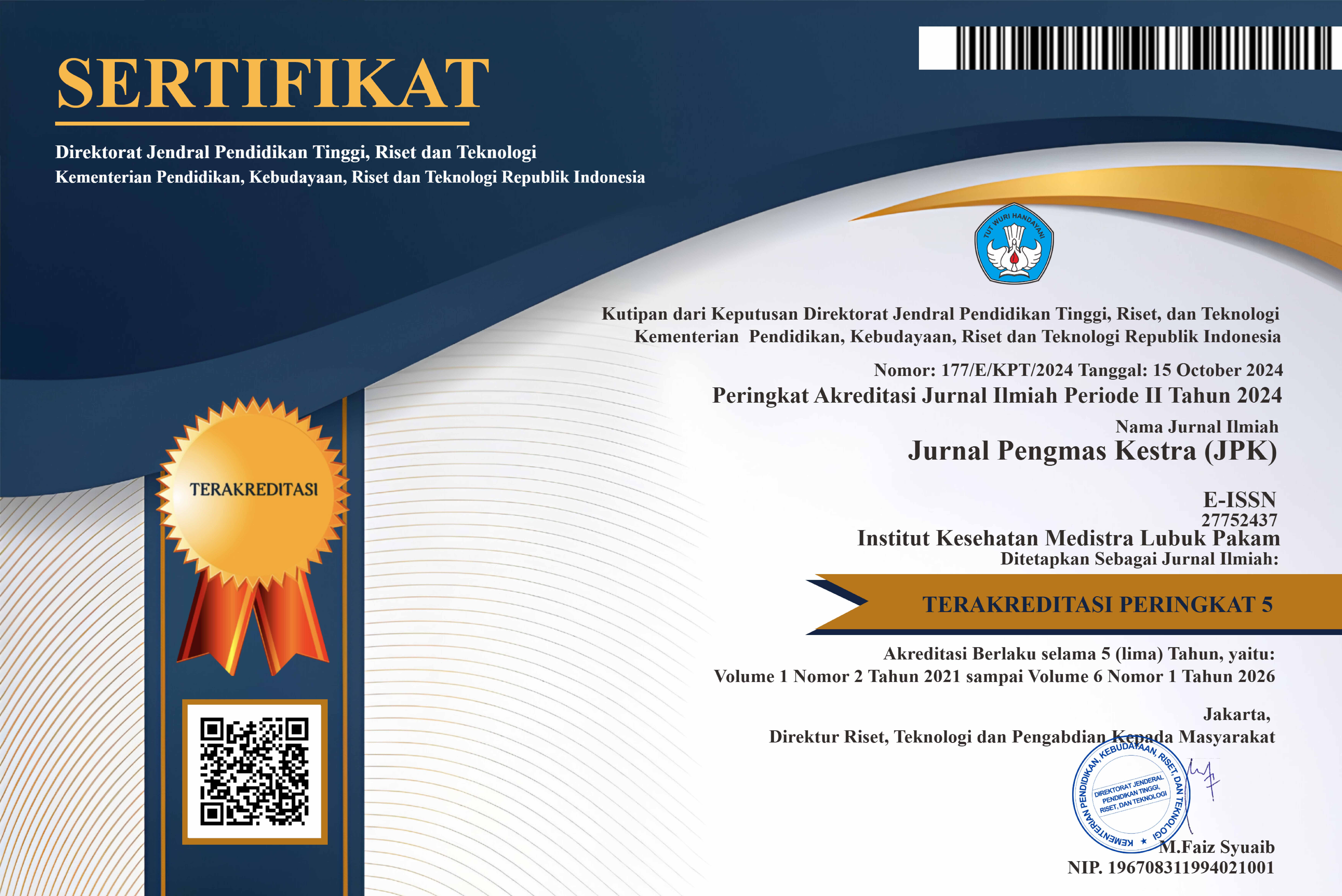PENINGKATAN MEKANISME KOPING PADA PASIEN KANKER PAYUDARA DI RUMAH SAKIT GRANDMED LUBUK PAKAM
COPING MECHANISM AND BREAST CANCER
DOI:
https://doi.org/10.35451/jpk.v1i1.749Keywords:
coping mechanism and breast cancerAbstract
The success of the coping mechanism in patients with breast cancer depends not only on early detection but also an understanding of the mechanisms that cause it. Psychological impact experienced by each patient, especially breast cancer which underwent different treatment depending on the level of severity (stage). The differences before and after being given education can affect the coping mechanism of the individual itself. One of the conditions that can cause anxiety is the process of implementing chemotherapy treatment. The purpose of this study was to determine the increase in coping mechanisms in breast cancer patients at Grandmed Lubuk Pakam Hospital. Counselling was carried out to see an increase in coping mechanisms, namely by directly informing breast cancer patients about coping mechanisms with education, distributing leaflets and analyzing data before and after education. Data analysis was performed using the Paired Sample T-Test with a confidence level of 95% and a value of α = 0.05. The results obtained from this study have shown a change in the coping mechanism of the patient before and after being given education on the application of the coping mechanism with a p-value = 0.001 (α> 0.05). In conclusion, there is an increase in coping mechanisms in breast cancer patients who are carried out according to standards, for health institutions there is a need for supervision and counselling to the public about the importance of maintaining health, especially for breast cancer patients at Grandmed Lubuk Pakam Hospital.
References
Andri, & Yenny Dewi, P. (2017). Teori kecemasan berdasarkan psikoanalisis klasik dan berbagai mekanisme pertahanan terhadap kecemasan. Majalah Kedokteran Indonesia.
Astuti, N. M., Sustrami, D., Hastuti, P., Nurlela, L., & Herningtiyas A.N, F. (2019). Karakteristik Mekanisme Koping Pasien Kanker Payudara di Poli Bedah Onkologi Rumkital Dr. Ramelan Surabaya. Jurnal Ilmiah Keperawatan Stikes Hang Tuah Surbaya. https://doi.org/10.30643/jiksht.v13i1.23
Aziz, A. H. (2017). Metodologi Penelitian Keperawatan dan Kesehatan. In salemba medika.
Diyono, & Mulyanti, S. (2013). Keperawatan Medikal Bedah: Buku Ajar. In Keperawatan Medikal Bedah: Buku Ajar.
Gambaran Kualitas Hidup Pada Wanita Dewasa Awal Penderita Kanker Payudara. (2019). Psikologia: Jurnal Pemikiran Dan Penelitian Psikologi. https://doi.org/10.32734/psikologia.v13i3.24633
Goyena, R. (2019). Faktor Yang Mempengaruhi Kualitas Hidup Pasien Kanker Payudara Di Rsup Dr M Djamil Padang Tahun 201. Journal of Chemical Information and Modeling. https://doi.org/10.1017/CBO9781107415324.004
Haryati, & Sitorus, R. (2015). Pengaruh Latihan Progressive Muscle Relaxation Terhadap Status Fungsional Dalam Konteks Asuhan Keperawatan Pasien Kanker dengan Kemoterapi di RS Dr.Wahidin Sudirohusodo Makassar. Medula.
Komite Penanggulangan Kanker Nasional. (2015). Panduan Penatalaksanaan Kanker Payudara. Kementerian Kesehatan Republik Indonesia. https://doi.org/10.1111/evo.12990
M, M. S. (2018). Pengalaman Masa Lalu, Kondisi Kesehatan Fisik, Konsep Diri dan Dukungan Sosial terhadap Mekanisme Koping. Jurnal Ilmiah Kebidanan Indonesia. https://doi.org/10.33221/jiki.v8i02.150
Mannopo, I. J. (2016). Hubungan paritas dan usia ibu dengan kanker serviks di rsu prof. kandou manado tahun 2014. Jurnal Skolastik Keperawatan.
Mardiana, D., Ma’rifah, A. R., & Rahmawati, A. N. (2013). Hubungan mekanisme koping dengan kualitas hidup penderita kanker servik di RSUD Prof. dr. Margono Soekarjo Purwokerto. Jurnal Keperawatan Maternitas.
Mubarak, W. I., Indrawati, L., & Susanto, J. (2015). Buku Ajar Ilmu Keperawatan Dasar. In Buku 1. https://doi.org/10.1111/ecoj.12426
Mulyani, N. S. (2013). Kanker Payudara dan PMS pada Kehamilan. Jakarta: Nuha Medika. https://doi.org/10.1117/12.474399
Notoatmodjo, S. (2012). Metodologi Penelitian Ilmu Keperawatan. In Jakarta: Salemba Merdeka.
Nurarif, A. H., & Kusuma, H. (2015). Aplikasi asuhan keperawatan berdasarkan diagnosa medis &NANDA. In trjectoriesof sleep quality and mood in the perinatal period. https://doi.org/978-602-72002-2-7
Rahayuwati, L., Sari, S. P., & Witdiawati. (2017). Studi kualitatif pola kehidupan pasien kanker payudara A Qualitative Study on Breast Cancer Patients Life. Journal Nursing Padjajaran.
Rahma, K. (2020). TERAPI KOGNITIF : SELF HELP GROUP PADA PASIEN KANKER PAYUDARA. National Nursing Conference. https://doi.org/10.34305/nnc.v1i1.117
Setiawan, D. (2015). the Effect of Chemotherapy in Cancer Patient To Anxiety. Jurnal Majority.
Smeltzer, S. C & Barre, B. G. (2017). Buku ajar keperawatan medikal-bedah Brunner & Suddarth. Journal of Chemical Information and Modeling. https://doi.org/10.1017/CBO9781107415324.004
Thompson, E. (2015). Hamilton rating scale for anxiety (HAM-A). In Occupational Medicine. https://doi.org/10.1093/occmed/kqv054
Utami, S. S., & Mustikasari, M. (2017). Aspek Psikososial Pada Penderita Kanker Payudara: Studi Pendahuluan. Jurnal Keperawatan Indonesia. https://doi.org/10.7454/jki.v20i2.503
Wijayanto, T. (2017) Pendidikan Kesehatan Terhadap Tingkat Kecemasan Pada Pasien Preoperasi Kanker Payudara. Jurnal Ilmiah Kesehatan. https://doi.org/10.35952/jik.v6i1.84
Nursalam. (2015). Metodologi Penelitian Ilmu Keperawatan :Pendekatan Praktis. In Salemba Medika.
Downloads
Published
Issue
Section
License
Copyright in each article is the property of the Author.




















